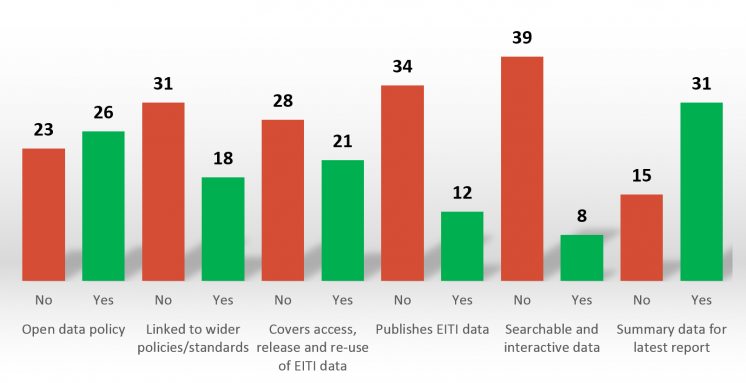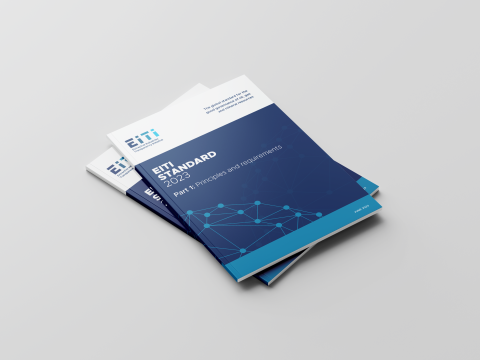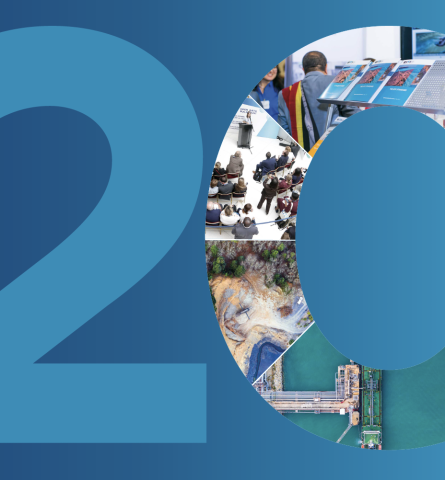
Survey on open data in EITI implementing countries
Survey on open data in EITI implementing countries
This blog is based on a survey undertaken by the EITI International Secretariat in January 2017. The results were presented to the EITI Board at its recent meeting in Bogota. The survey explores the status of EITI countries’ efforts in agreeing open data policies and providing EITI data in open formats. The survey will be repeated in 2018 to assess progress in addressing these issues.
Summary
The 2016 EITI Standard requires that implementing countries “agree a clear policy on the access, release and re-use of EITI data” (Requirement 7.1.b). This requirement came into force on 1 January 2017. In late January 2017 the International Secretariat surveyed implementing countries to assess adherence to this new requirement and examine progress in making EITI data more accessible. The survey found that 53% of implementing counties have agreed an open data policy and that the introduction of this requirement has encouraged MSGs to address data access, release and re-use.
However, while open data policies are being clarified, data accessibility continues to be disappointingly low. In most implementing countries, EITI data continues to be locked in pdf reports that are difficult to access and utilise. This significantly undermines the scope for using EITI data to contribute to public debate. Further efforts are needed to promote simple, low cost options for making EITI data more accessible.
Figure 1 – Results of the EITI Open Data Survey (January 2017)

Background
At the EITI Board meeting in Myanmar in October 2014 the International Secretariat provided an assessment on the availability of data from EITI Reports (EITI Board Paper 28-2-A – Implementation Progress Report June-September 2014). At that point, 35 implementing countries had collectively published more than 200 EITI Reports. However, in most countries, dissemination of the reports had focused on distributing a printed publication. The detailed data in the EITI Reports was typically locked within these publications.
In December 2015 the EITI adopted an open data policy. The policy notes that open data “can increase transparency about government and business activities, and increases awareness about how countries’ natural resources are used and how extractives revenues are levied and spent, providing strong incentives for that money to be used most effectively”. The 2016 EITI Standard requires that implementing countries “agree a clear policy on the access, release and re-use of EITI data”. It also requires that implementing countries “make the EITI Report available in an open data format (xlsx or csv) online and publicise its availability” (Requirement 7.1.c). Implementing countries are further “encouraged to publish EITI (data) under an open license, and to make users aware that information can be reused without prior consent”. The requirement to publish an open data policy came into force on 1 January 2017 through the approval of Board paper 34-4-A – Transitional arrangements for the 2016 EITI Standard.
Survey methodology
In late January 2017 the International Secretariat surveyed 49 implementing countries and considered six questions regarding adherence to these requirements:
- Has the MSG agreed and published an open data policy?
- Does the policy reference wider government policies and standards on open data?
- Does the policy cover the required concepts, as outlined in requirement 7.1.b; access, release, and re-use of EITI data?
- Has the National Secretariat published EITI data in excel or csv formats for their most recent EITI Report, as per requirement 7.1.c?
- Is available data searchable and interactive (i.e. not static pictures/tables/pdf files)?
- Has the National Secretariat submitted summary data for their latest report?
Results
The results of the survey are presented in Table 1. 26 of the 49 countries surveyed had developed an open data policy. The policies are available on the EITI website. Several more policies are expected to be agreed shortly and at least three policies are pending approval by MSGs.
21 of the 26 policies cover the required aspects of access, release, and re-use. Most policies include information stating that data shall be open by default, and should be timely, comprehensible and accessible. There are few policies referring to specific open data formats, such as csv or excel. Some of the submitted policies neglect the concept of re-use altogether. This last point implies that policies have not specified what type of user-/content-licenses the MSGs intend to utilise for their open format publications. Nigeria has been found to address all of these issues, incorporating guidelines for timing for information release, what levels of information to make available, including formats and license types to be used for the disclosures. The policy also states that going forward more complex formats for open data should be used, where data-points and structures are directly linked with various databases.
Of the first 26, 19 explicitly link and/or refer to wider government policies and commitments on open data. Most of the wider government policies refer to government-wide efforts on open data and commitments to the Open Government Partnership. In Madagascar, the policy refers to increasing linkages to government efforts in open cadastre information, specifically tied to the modernisation of their Mining Permits Management System. Other common references are to laws on freedom of information and other similar legislation. Only four countries refer to specific international data standards.
While 31 countries have submitted summary data files to the International Secretariat, only 12 countries have made EITI data available in open formats on their own webpages. This demonstrates that data is available in open data formats, it is not being made available at the local level. Disclosure of EITI data in open formats can be as simple as publishing excel files containing the tables and graphs included in EITI Reports, as Zambia did for their 2013 report. However, these simple measures are not being adopted in most countries. Some notable open data platforms in EITI countries are from the Democratic Republic of Congo (Map-X and ITIE-RDC), Ghana EITI, Mongolia EITI and USEITI.
Concluding comments
The survey highlights that there is a growing awareness of open data policy issues. However, the accessibility of EITI data is a continuing concern. The International Secretariat’s plans to address these issues have been incorporated into the action plan to promote mainstreaming agreed by the EITI Board in October 2016. The action plan includes a number of activities to support the development of open data policy and practice, including awareness raising activities, targeted support to implementing countries, and developing low-cost practical tools to support mainstreaming and open data. While the move towards EITI mainstreaming can help reduce the cost of EITI reporting, there may be considerable up-front costs in building or modifying information systems. The International Secretariat will support national secretariats in mobilising funding for this work.
Table 1 – Results of the EITI Open Data Survey (January 2017)
| Has the MSG agreed and published an open data policy? | Does the policy reference wider government policies and standards? | Does the policy cover the required concepts, as outlined in requirement 7.1.b? | Do they publish EITI data in open formats, as per requirement 7.1.c? | Is the data searchable and interactive? | Have they submitted Summary data for their latest report? |
|---|---|---|---|---|---|---|
Afghanistan | No | No | No | No | No | Yes |
Albania | Yes | Yes | No | No | No | Yes |
Azerbaijan | Yes | Yes | Yes | No | No | No |
Burkina Faso | Yes | Yes | Yes | No | No | No |
Cameroon | No | No | No | No | No | No |
Chad | No | No | No | No | No | No |
Colombia | No | No | No | No | No | Yes |
Republic of the Congo | Yes | No | Yes | No | No | No |
Côte d'Ivoire | No | No | No | No | No | No |
Democratic Rep. of Congo | No | No | No | Yes | Yes | Yes |
Ethiopia | Yes | Yes | Yes | No | No | Yes |
Ghana | Yes | Yes | Yes | Yes | Yes | Yes |
Guatemala | No | No | No | No | No | No |
Guinea | Yes | Yes | Yes | No | No | No |
Honduras | No | No | No | No | No | Yes |
Indonesia | No | No | No | No | No | Yes |
Iraq | No | No | No | No | No | Yes |
Kazakhstan | No | No | No | Yes | Yes | Yes |
Kyrgyz Republic | Yes | No | Yes | Yes | No | Yes |
Liberia | No | No | No | No | No | Yes |
Madagascar | Yes | Yes | Yes | No | No | No |
Mali | No | No | No | No | No | No |
Mauritania | No | No | No | Yes | No | Yes |
Mongolia | Yes | No | Yes | Yes | Yes | Yes |
Mozambique | Yes | Yes | Yes | No | No | Yes |
Myanmar | No | No | No | No | No | Yes |
Niger | No | No | No | No | No | No |
Nigeria | Yes | No | Yes | No | No | Yes |
Norway | No | Yes | Yes | No | No | Yes |
Peru | No | No | No | No | No | Yes |
Philippines | Yes | Yes | Yes | Yes | No | Yes |
Papua New Guinea | Yes | Yes | Yes | No | No | Yes |
São Tomé and Príncipe | No | No | No | No | No | Yes |
Senegal | Yes | Yes | No | Yes | Yes | Yes |
Seychelles | No | No | No | No | No | Yes |
Sierra Leone | Yes | Yes | Yes | Yes | Yes | No |
Solomon Islands | No | No | No | No | No | No |
Tajikistan | Yes | Yes | No | No | No | Yes |
Tanzania | No | No | No | No | No | No |
Timor-Leste | No | No | No | No | No | Yes |
Togo | Yes | No | No | No | No | No |
Trinidad and Tobago | Yes | No | No | No | No | Yes |
Ukraine | Yes | No | Yes | Yes | No | Yes |
United Kingdom | Yes | Yes | Yes | Yes | Yes | Yes |
United States of America | Yes | No | No | Yes | Yes | Yes |
Zambia | Yes | No | Yes | Yes | No | Yes |
TOTAL, with EITI data N = 46 | 23 | 15 | 18 | 12 | 8 | 31 |
50 % | 33 % | 39 % | 26 % | 17 % | 67 % | |
Dominican Republic* | Yes | Yes | Yes | No | No | No |
Germany* | Yes | Yes | Yes | No | No | No |
Malawi* | Yes | Yes | Yes | No | No | No |
TOTAL N = 49 | 26 | 18 | 21 | |||
53 % | 37 % | 43 % |
* Dominican Republic, Germany and Malawi has not yet produced EITI Reports and have therefore not been expected to disclose EITI data in open formats.



